The Sydney I know isn’t like what they’re showing on the news
Tragically my home city has been in the international news for all the wrong reasons and we’re all feeling traumatised and shocked and heartbroken.
What about you?
You only know what you see in the media, like the photo below. So beyond the Harbour and the Opera House, perhaps you don’t know what Sydney is actually like.
I thought I’d show you a snapshot of what it’s really like where I live, on Bidjigal land, the unceded territory of the Eora Nation.

12 days of Winter Wonder Photo Challenge by Micro.blog: Dec 15 - Frost 📷
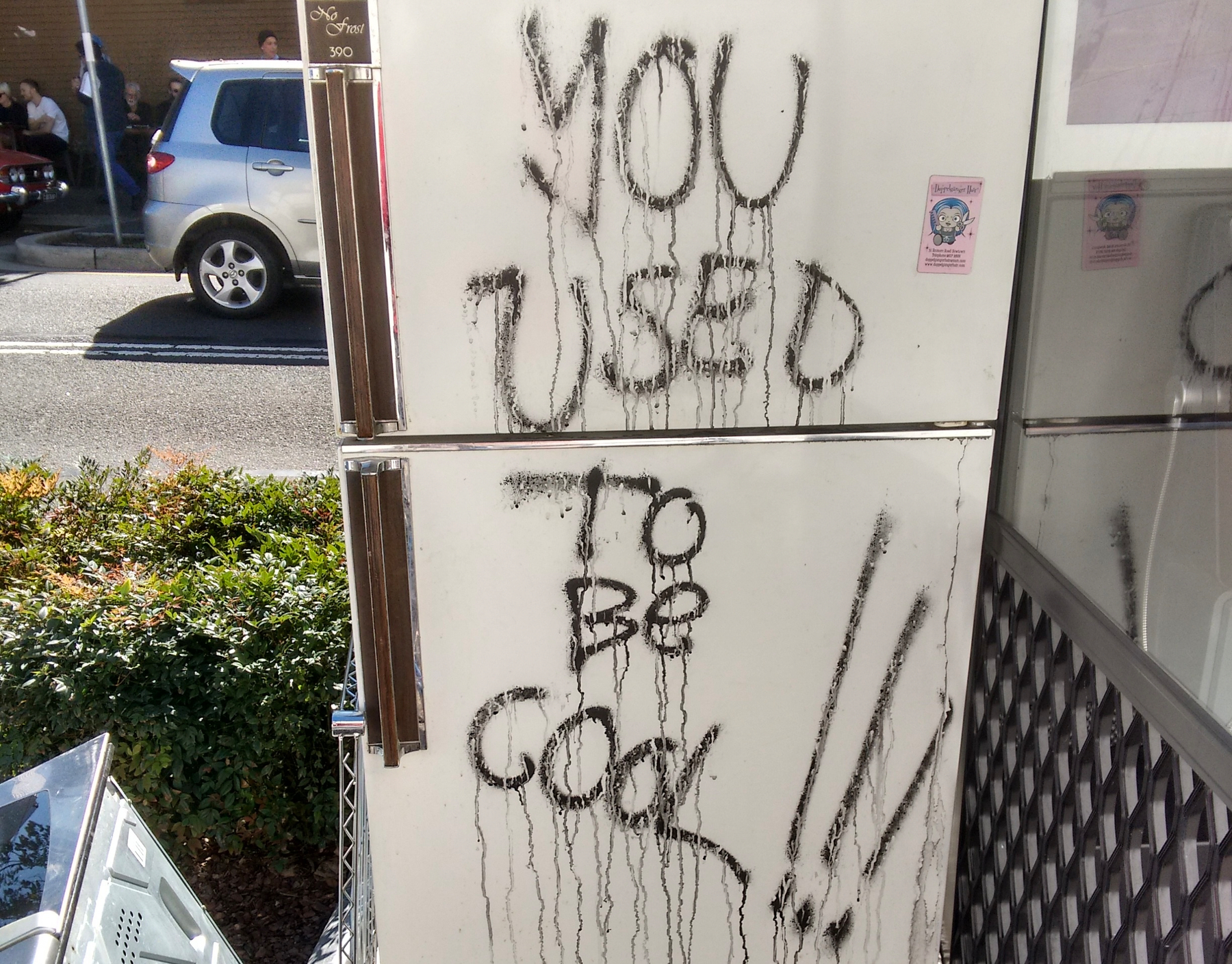
We don’t have frost here so this is the best I could do. Also, it’s not Winter in Australia. Just saying.
💬"The term “breaking the mold” is common, but without having learned anything from others, one cannot depart from or break away from anything.” - Prof. Shigeru Ushida.
#shuhari #education #lifelonglearning
Shu Ha Ri and the philosophy of interior design
The late interior designer Professor Shigeru Uchida discusses the importance of Shu Ha Ri for design:
💬 “The current education system lacks “Shu.” There’s a total absence of the attitude to observe, study, and learn from others. The term “breaking the mold” is common, but without having learned anything from others, one cannot depart from or break away from anything.”
I’m the author of Shu Ha Ri. The Japanese Way of Learning, for Artists and Fighters, available now in paperback and ebook.
Trying to write slowly in 2025
Before I really got going with the Zettelkasten approach to making notes (and with micro.blog) I was publishing only a handful of posts here each year.
But then my productivity exploded.
In 2023 I published 202 posts here, and this post equals that count for 2025, even though the year isn’t done yet.
In 2025 I also edited a collection of essays and published my own book.
So I’m quite happy with the year’s output. And thank you for reading along with me, I really appreciate it.
But don’t worry, in 2026 I’ll still be trying to write slowly.
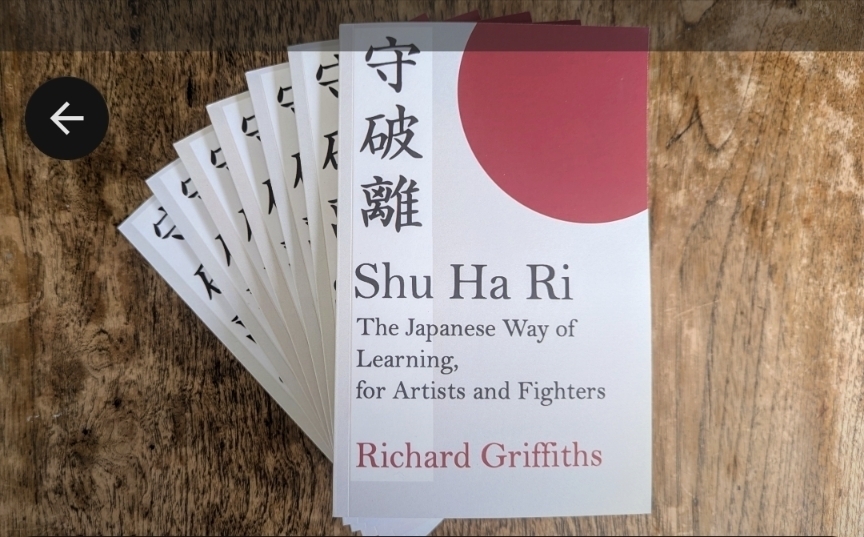
This little book would make a great present for the artist, fighter, learner, teacher, or straight-up Japan-lover in your life. Just saying.
Towards sunset, beneath Fushimi Inari Taisha, the city of Kyoto is laid out like a silver plate.

I’m the author of Shu Ha Ri: The Japanese Way of Learning, for Artists and Fighters, available now.
#Kyoto #FushimiInariTaisha #Japan #SunsetView #JapanTravel #JapanPhotography #VisitJapan #ShuHaRi #JapaneseCulture
Imitating the greats?
Imitation can be a very effective form of learning, but it’s worth considering who to imitate, and how.
Writers often seek to imitate the greats, but it interesting how far the star of some supposedly timeless writers can fade. Here’s William Zinsser, the well-read author of ‘Writing to learn’, on how he did it.
“Writing is learned by imitation. I learned to write mainly by reading writers who were doing the kind of writing I wanted to do and by trying to figure out how they did it. S. J. Perelman told me that when he was starting out he could have been arrested for imitating Ring Lardner. Woody Allen could have been arrested for imitating S. J. Perelman. And who hasn’t tried to imitate Woody Allen? Students often feel guilty about modeling their writing on someone else’s writing. They think it’s unethical—which is commendable. Or they’re afraid they’ll lose their own identity. The point, however, is that we eventually move beyond our models; we take what we need and then we shed those skins and become who we are supposed to become.”
So who are these people I’ve never heard of, I wondered, who could all have been arrested for imitating one another? I mean, they couldn’t, could they? It’s not actually illegal, is it? Or did Zinsser mean plagiarism?
It turns out that Ring Lardner was an American sports journalist and satirist whose work was greatly admired by many of the major authors who were his contemporaries. In his high school newspaper Ernest Hemingway used the pen name, ‘Ring Lardner Jr’. Lardner became a friend of F. Scott Fitzgerald and he inspired the writing of John O’Hara (another great writer whose name is seldom heard these days). In The Catcher in the Rye, J.D. Salinger gave Lardner a backhanded compliment by having his protagonist, Holden Caulfield, name Lardner as his second favourite author. So for Hemingway at least the juvenile imitation seems to have extended to impersonation.
Clearly I need to read some Ring Lardner.
S.J.Perelman was a humourist, writing especially for the New Yorker. He was admired by T.S. Eliot, Somerset Maugham, Garrison Keillor, Frank Muir, and Woody Allen. Another writer I’ve never heard of, who seems to have been inspirational. But then…
“Who hasn’t tried to imitate Woody Allen?” Is a question I’ll leave hanging in the wind.
Author and academic Adam Roberts has an interesting post about Jonathan Buckley’s novel, One Boat (2025), which appears to use Laurence Durrell’s adjectives as a model for how one of his own characters might over-write their diary. Durrell is an author whose star has certainly faded, even though he was nominated several times for the Nobel Prize for Literature. And his style is certainly not admired these days. As Roberts says,
“giving his narrator these Durrellisms: the point of this adjectival affectation, or addiction, is to characterize her as someone groping, somewhat desperately, for expression, or the impossibility thereof”
Well, whether this is a deliberate imitation in order to show a diarist whose purple prose, like Durrell’s gallops away from them, or whether, as Adam’s seems to suspect, it isn’t, whether Buckley was doing something very clever and ‘meta’ with his character’s imitation, or whether he was just getting away with it, all the same, the novel was long listed for the Booker Prize.
I’m the author of Shu Ha Ri. The Japanese Way of Learning, for Artists and Fighters, available now.
💬 "When they email or text me about a post it feels like applause from a dark corner of a large, empty theater where I rehearse."
https://daniel.industries/2025/11/22/why-write-online/
/cc @writingslowly
Daniel kindly replied to my meandering questions about writing online, which circled the theme of ‘what’s the point?’
His blog is a commonplace book, written first for himself. He says blogs got hit hard by social media. I called it the Rapture. There’s only us left!
But not quite. You’re here too.
💬 “You cannot transcend a craft you have not yet learned.”
#shuhari #LifelongLearning
🎬 Paper Films! In the 1930s, Japanese films were made on fragile paper rolls. Nearly lost forever, researchers have digitized and preserved this unique history! Learn more: Japanese Paper Films.
#PaperFilm #FilmHistory #JapaneseFilm #LostMedia #JapaneseFilmFestival #JapaneseHistory
Japanese paper films
Japanese paper films! What?
Yes, in the 1930s the Japanese made a whole bunch of short movies using rolls of paper instead of celluloid.
With the aid of a bright light and some clever mirrors this actually worked. But the technology never really took off and these paper movie reels, originally made for showing at home, were basically forgotten. Worse, the paper was fragile and highly susceptible to disintegration.
Game over for paper films?
Not quite.
Researchers eventually realised what a treasure trove this is, if only it could be rescued. They worked out a way of restoring, or rather preserving, and digitising the remaining movies and now, amazingly, it’s possible to view them in all their preserved (not restored) quirkiness.
I was lucky enough to be able to experience these paper films in a presentation to a packed house at the Art Gallery of New South Wales. There was live music too, which was exquisite, and really complemented the films that didn’t have an original ‘78 record soundtrack, which was the majority.
The presenter was Professor Eric Faden, who has devoted an impressive amount of time and effort to ensure these unique cultural artifacts weren’t lost to decay. They’re now a showpiece of the 2025 Japanese Film Festival and a valuable element of Japanese and international film history.

Now, through the magic of the Internet, you can see many of the recovered paper films for yourself, on the project’s Bluesky account.
And here’s a news story from Japanese TV (English language).
I’m the author of Shu Ha Ri. The Japanese Way of Learning, for Artists and Fighters, available now.
“Each person possesses a mind with powers that are… always unique. — César Aira.
In an age of ‘thinking’ machines, what is the feat that only you could have carried out?
#WritingCommunity #UniqueVoice #AIandWriting #Blogging
💬 “The way we organise our online lives bleeds into the way we organise the rest of our social interactions. If it’s just assumed without question that the online space is a fiefdom, then democracy everywhere is undermined.”
Why niche blogs and small rooms still win
#DigitalLife #Blogging #OnlineCommunity #SmallWeb #Fediverse #Decentralization
What is the feat that only you could have carried out?
💬 “Each person possesses a mind with powers that are, whether great or small, always unique, powers that belong to them alone. This renders them capable of carrying out a feat, whether grandiose or banal, that only they could have carried out.” ― César Aira, The Literary Conference
I love Aira’s work, and his unique writing method, the constant flight forward, which belongs to him alone.
I’ve previously claimed that more than ever, embracing your humanity is the way forward.
That’s partly because there’s plenty we can’t beat machines at doing, so we might as well lean into not being machines. But also, as Aira observes, each human is a unique creation, with something unique to offer the world.
I’m the author of Shu Ha Ri: The Japanese Way of Learning, for Artists and Fighters, available now.
Remembering Tea Master Sen Genshitsu (1923-2025), who spread peace through sipping.
His philosophy is quoted on page 53 of my book, Shu Ha Ri: The Japanese Way of Learning: writingslowly.com/shuhari-b…
#SenGenshitsu #Chado #Peace #ShuHaRi #UNESCO
💬 “By jumping off your roof into a paddling pool with a goat in it you’ve probably enjoyed millions of views. You’ve probably gone totally viral. But the thing is… I don’t want to be a serf on someone else’s plantation.”
💬 Everyone has principles, don’t they, until the moment they see the phrase, “MySQL wasn’t configured properly”?
Why niche blogs and Small Rooms still win - even in the age of technofeudalism
Views? I’ve had a few
Blogging is about creative expression, but as Tom Critchlow observes, it’s also about finding the others. I love blogging, and I have a personal blog that I love writing on. I guess you already know that, right? But I have to admit it, the Internet doesn’t treat blogs particularly well. The issue is that there’s no discovery flywheel for a blog. Google search is unlikely to make you visible, so you have to do all the work yourself of promoting it to potential readers. And as everyone knows, attention is a scarce resource these days. In contrast, social media thrives on showing people what you’ve made and algorithmically fine-tuning this to reach as many of the right people as possible.
I don’t love social media. In fact I do my best to avoid it. But I don’t mind forum sites so much, where the moderation keeps things at least a little civil.
Well, happily, my blog does have readers, a few at least.
To monitor reading figures, I use a very basic analytics service which respects users' privacy.
I could see from the dashboard that by June 2024 my site was getting about 1,200 views in a month. That’s amazing - thank you, to all of you, especially the keen ones right at the front taking notes! You’ll do well in the test later.
 .
.
This is what a thousand people look like, though they’re not always as keen as this lot.
By July 2025 the count had risen to 6,000 views a month, where it now hovers. This may seem like a small number compared with how many times Beyonce’s been listened to, but it also compares very well with the number of people I can shout to across a crowded bar.
Now the most viewed individual post in June 2024 gained 216 views. It’s a more select crowd, but a crowd all the same! (Thanks for cheering, by the way).
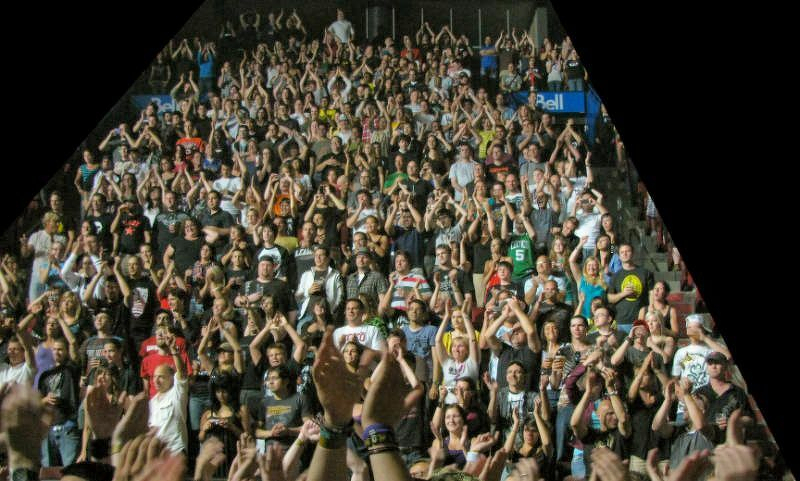
A crowd of 250 people is still a crowd.
And a year later it was still gaining 64 views per month. Here’s the thing though. The same post with 216 views on my website reached considerably more readers on Reddit. It had 3,200 views there, which is about fifteen times more eyeballs! And a year later it had doubled that count.
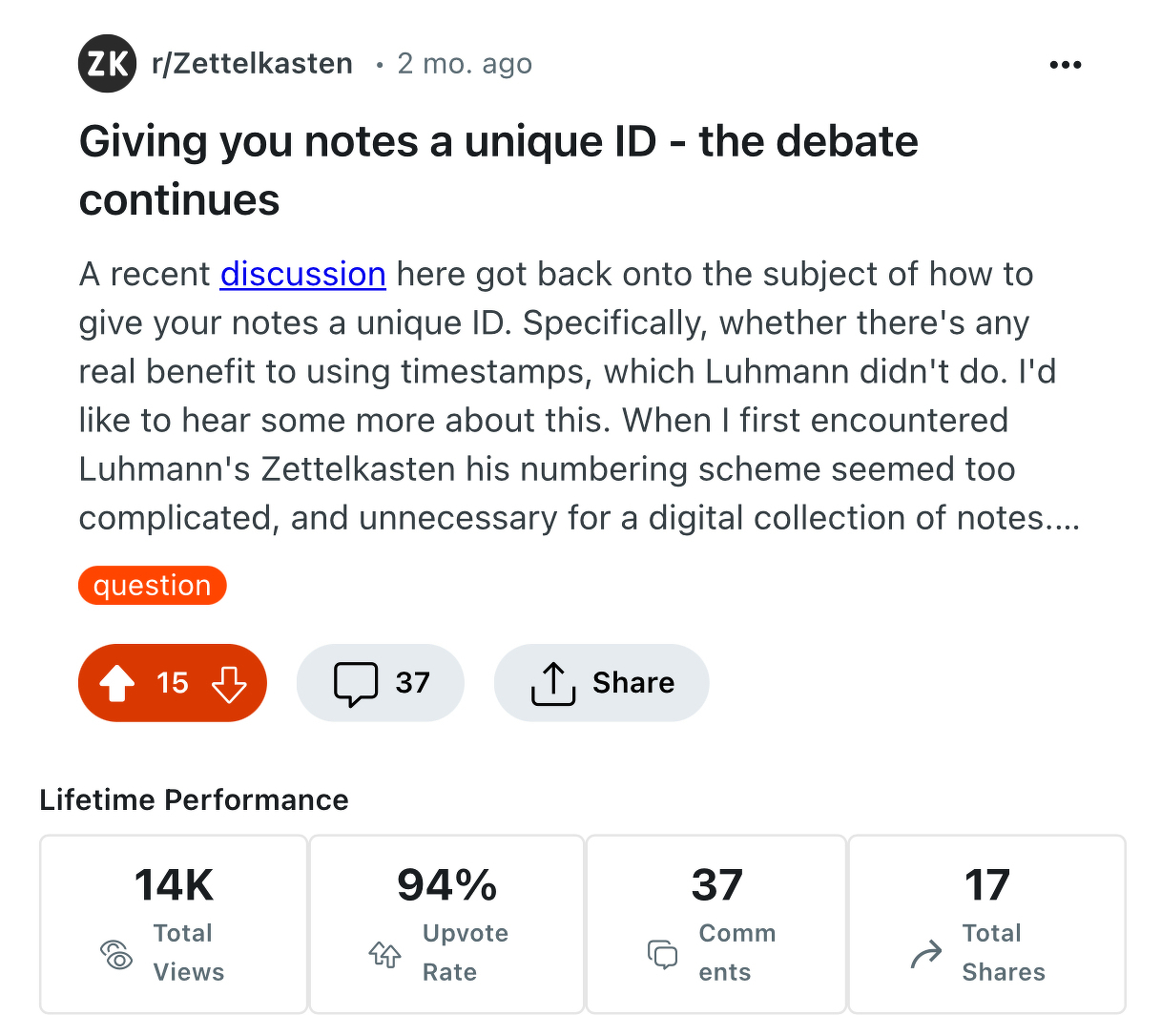
And one of my more popular posts on Reddit has had 14,000 views, which, amazingly, is more views than this tennis match had!1

This tennis match had 10,000 viewers - almost as many as my crappy post on Reddit
But that’s not the very most popular post of mine on Reddit. That would be this more recent one, with 71,000 views, a lot like this exciting football match:

These audience size images, by the way, come from Visualizing crowd sizes.
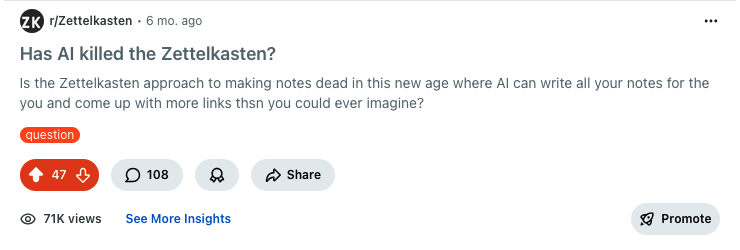
It’s ironic that my most viewed piece of writing is a single sentence long and it contains a very obvious spelling mistake.
Now to me this looks like a very big stadium. Top sports teams and pop stars would be happy with those numbers. But if you’ve posted stuff on the big platforms like Facebook, Instagram and Xitter (I’m told the X is pronounced ‘Sh’), you’re probably already laughing at these ‘tiny’ numbers. By jumping off your roof into a paddling pool with a goat in it you’ve probably enjoyed millions of views. You’ve probably gone totally viral. You’re probably a certified influencer too. But the thing is…
I don’t want to be a serf on someone else’s plantation
I can’t stand technofeudalism, in which a few billionaires own the platforms and we’re just sharecroppers in their extractive systems. Unhappily, as economist Yanis Varoufakis observes in his book, Technofeudalism, it’s the state of the world these days.

I’m never going to jump off my roof into this paddling pool, not even for views. Not even for likes.
I want a different world (I know, right?), in which data portability and interoperability are the norm, so that if I want to switch platforms I can take my ‘connections’ with me. As Professor Sinan Aral, author of Hype Machine, has imagined, “consumers would own their identities and could freely switch from one network to another.” This wouldn’t just be good for me, it would be good for the whole ecosystem, since it would give the neo-feudal platform overlords an incentive to provide a better service than that of their competitors. The Three-legged Stool is just one vision of how this could work in practice.
Meanwhile, I support services that already support interoperability. My blog is hosted by Micro.blog, which encourages me to syndicate it to other places, including Mastodon and BlueSky, which also support (some) interoperability. I’m anticipating the arrival of the Pluriverse by building it, one blog post at a time.
On the other hand, there’s a certain logic to performing where the audience is. When I was a kid I used to practice my music in public by busking. And I always busked where the crowds were, not down an empty back alley where no one was listening. My parents disapproved, until I told them how much I was earning.
If you believe your work is worth reading, then you probably also believe it’s worth getting it read by more than one person.
It’s a bit of a contradiction. Even progressive organisations like New Public, which exist ‘to reimagine social media’ nevertheless use extractive venture-capital platforms like Substack, which allegedly profits from hosting Nazis. This seems a far cry from New Public’s mission of ‘building digital public spaces that connect people, embrace pluralism, and build community’.
So these large systems that promise to promote your kind, helpful informative posts, also promote hate-speech and genocide.
But what’s the alternative? Shout into the void?
Actually, Molly White, with more than 20,000 subscribers, wasn’t happy with Substack, and she decided she didn’t want any platform dependence at all, so she rolled her own, and gave detailed instructions for anyone who might want to do the same.
Unfortunately, this isn’t simple. It’s not terribly difficult, but the bar is just high enough that it’s obvious that most people won’t bother. I mean, everyone has principles, don’t they, until the moment they see the phrase, “MySQL wasn’t configured properly”?
I’m not going to help out the haters, but I wouldn’t mind getting a few views, but also I’m not a tech wizard.
It’s a dilemma.
So where online are the people who might find my writing worthwhile? I might have some good reasons to prefer my blog over social media, but that doesn’t mean my audience does. Let’s say I’m writing a post about getting more readers. If I want to help people with this post, I need to think a bit about who it’s for and where these people usually go to get their information.
On reflection, it seems the obscure niche subjects I like writing about are well-suited to online ‘small rooms’ like subreddits, forums and discord groups, rather than ‘big rooms’ like Facebook and TikTok, where ‘context collapse’ is the norm.2
That’s because I’m not posting memes and ‘hot takes’. No goats were surprised by amateur divers in the making of this article. I’m trying to provide thoughtful, eccentric observations for thoughtful (not at all eccentric) readers, so context is everything. This means my interim solution is to post first on my blog, then syndicate where I can, then cross post to small rooms, manually when necessary. It’s a work in progress, but I do seem to be making a little progress.
My book, Shu Ha Ri: The Japanese Way of Learning, for Artists and Fighters is available right now and it’s selling fine, even though it’s a niche subject and I’m a marketing team of one.
A second reason I’m keen on my own website is that it’s a way of keeping a record of the canonical version of my online writing. The big platforms can just disappear overnight, taking everything with them as they go. Disappearance is also part of business as usual for social media. For example, Pew Research found that in 2023, 1-in-5 (20%) English language tweets had become inaccessible just three months after posting on Twitter (now X). I’d prefer to have some control over the longevity of my work. That’s why syndication is a good plan. Unfortunately, many of the big platforms don’t support it at all. The only way to syndicate is by hand, by copying and pasting. It’s feasible (I do this occasionally with Reddit), but not very efficient.
This matters because the way we organise our online lives bleeds into the way we organise the rest of our social interactions. If it’s just assumed without question that the online space is a fiefdom, then democracy everywhere is undermined.
For wise words on this subject, read Governable Spaces, by Nathan Schneider.
OK, so I know what I’m doing here (at least in one sense of that phrase), but what about what you should do? One piece of advice I do have is to notice how many people actually are reading, listening to or watching your stuff. Really notice. It might be a room-full, or a stadium-full. Every one of your readers, listeners or viewers has spent precious time and effort to engage with your thoughts, and whether or not it pays your bills, that’s amazing and worth pausing a moment to appreciate.
So here’s the point where we pause for a moment to appreciate the wonder that anyone at all is noticing our stuff.
Wow.
But unfortunately that’s all the advice I can give right now. Yes, I’d like to think niche blogs and Small Rooms still win, but that surely depends on how you define ‘winning’. I’m probably doing it all wrong. AI is rapidly transforming the whole landscape of discoverability. Organic search is less and less viable when AI summaries are everywhere. Perhaps, as some are prophesying, the humble hyperlink is dead.
So rather than tell you how to reach your readers (as if!), I have a question for you: how do you reach your readers already, right now, and how do you expect to in a near future dominated by lots of AI hype and quite a bit of AI reality?
What’s changing for you? Are you pumping up the paddling pool right now in preparation for a pivot to YouTube and massive fame? Would you still write if you had a single reader? And do you appreciate the readers you do have?
Oh, it turns out I have quite a few questions.
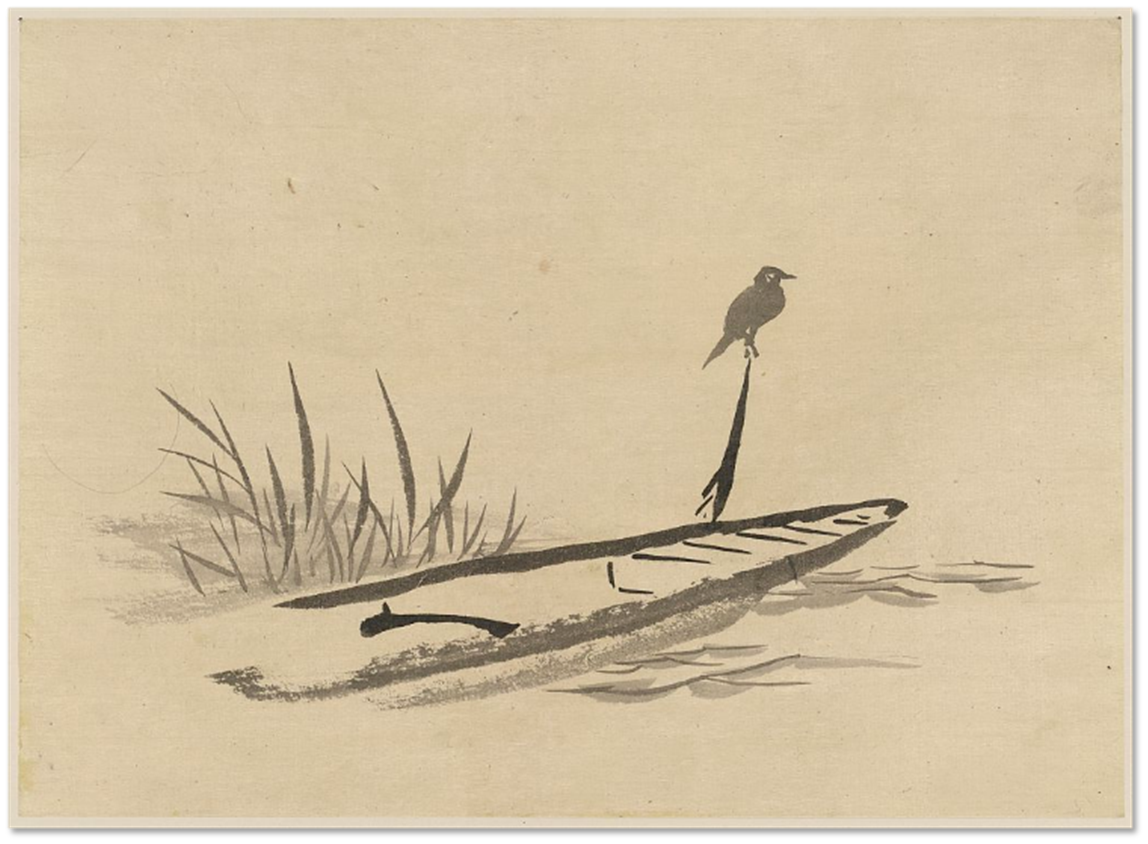
For still more questions and precious few answers, subscribe to the weekly Writing Slowly email digest.
-
It’s naive to trust Reddit’s figures, but that’s what they say, and you can’t do your own analytics. Well, I can’t anyway. ↩︎
-
I’m borrowing a taxonomy of social media that includes big rooms, small rooms and many rooms. ↩︎